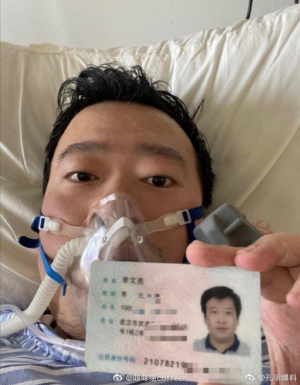Li Wenliang, a Wuhan doctor who was among the first to raise the alarm about the new coronavirus, has passed away after contracting the disease, Global Times reports. He was 34 years old.
Li was one of eight doctors reprimanded by police for posting online about a then-unknown disease that they had seen in hospital patients. Li noted that the symptoms were similar to those of SARS, which caused a deadly epidemic in 2003. He sent a WeChat message on December 30 to his classmates from medical school, informing them of what he had seen and warning them to be careful.
“I only wanted to remind my university classmates to be careful,” Li later told CNN. But then he realized his message was being shared over and over again, this time publicly. “I realized that it was out of my control and I would probably be punished,” he said.
Sure enough, Li was visited by police and forced to sign “an official letter of criticism” for having “severely disturbed the social order” by making false postings online. He later posted a photograph of the document on his Weibo account.
The Wuhan police initially tried to make an example of Li and his fellow doctors, publicizing that eight people had been punished for “spreading rumors” about the disease. Notably, however, the police did not announce that all eight “rumor-mongers” were doctors. At the time – January 1 – rumors of the new disease were beginning to leak out, but the Wuhan government was denying the claims and urging the public to stay calm. When the government did an about-face weeks later, it was clear that Li and his colleagues had been right about the potential outbreak all along. Their cases became one more damning piece of evidence that the local government had been desperately trying to cover up early warning signs about the new disease. The revelation sparked immense public outrage.
Of the eight doctors, Li’s case garnered the most attention. For one thing, he began to post publicly about what had happened on social media, and accepted media interviews (including with the U.S. outlet CNN). But perhaps most importantly, the fact that Li himself had caught the coronavirus gave his case an undeniable pathos. The doctor who had tried to warn his friends about a mysterious new disease became infected himself – and now, tragically, has passed away.
Interestingly, Li’s later comments were not deleted by the censors, and Chinese media outlets reported on his story as well. His case could be discussed on social media without posts being immediately deleted, as often happens when the authorities decide a topic is sensitive. And tellingly, the state-run Global Times was among the first to report the news of his death, which is likely to spark another round of fury from Chinese netizens.
China’s censors seem to have decided to allow for some rare openness on this case. Maria Repnikova wrote an excellent overview of the ever-shifting limits of Chinese media coverage of the coronavirus epidemic, which concludes: “Even under President Xi Jinping, the government is sensitive and somewhat responsive to bottom-up pressure from the people — their need to know, their calls for accountability.” That “bottom-up pressure” may be the reason news about Li Wenliang – who caused a scandal precisely because of his run-in with China’s censorship regime – is being allowed to circulate on the Chinese internet.
As of this writing, Li’s January 31 post explaining how he was forced to sign a self-criticism by the police had been shared over 114,000 times, with 945,000 thumbs up.
His final Weibo post, made on February 1, said that he had tested positive for the new coronavirus strain.
Five days later, he was dead.
As news of his death spread, reporter Jane Tang noted on Twitter that the hashtag “#武汉政府欠李文亮医生一个道歉# (Wuhan gov owes [Li] an apology) is trending on Chinese social media Weibo at 9:40 Am ET.”
An hour later, the same hashtag had been blocked on Weibo. A search for that term now returns the notice that “Under relevant laws, regulations, and policies, this topic page could not be displayed.”

































